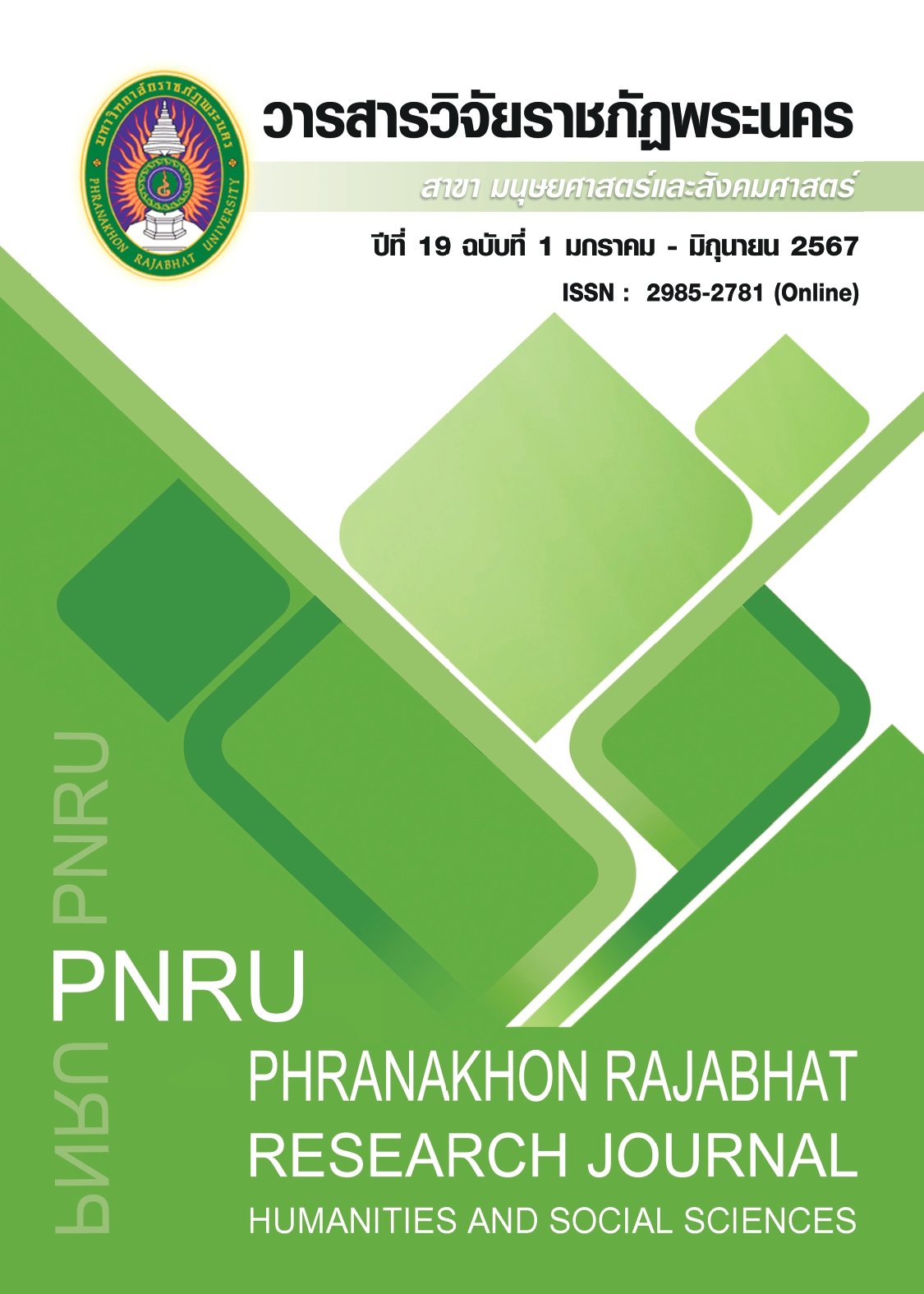DEVELOPMENT OF ENGLISH LANGUAGE SKILLS TRAINING CURRICULUM FOR NON-ENGLISH MAJOR TEACHERS IN ONGKHARAK SCHOOL IN NAKHON NAYOK PROVINCE
Main Article Content
บทคัดย่อ
The implications of English as a global language play a significant role in the context of English language teaching and learning in the present. It is crucial for all teachers, not only those who are majoring in English but also those in other fields, to be able to use English and encourage students to learn English within their specific disciplines. This present study aims to investigate the problems and needs for developing an English language skills training curriculum. Additionally, it seeks to examine and compare the learning achievements and satisfaction of 71 non-English major teachers in Ongkharak School, Nakhon Nayok Province, concerning the application of the training curriculum. A mixed-methods approach involving both qualitative and quantitative data analysis was employed. The results revealed that the respondents/participants had moderate levels of difficulty in all English language skills overall, and the highest mean average score was found in listening skills. Regarding the need to develop English language skills, the respondents expressed a high average level of desire to improve their listening skills, while they revealed neutral average levels of need to improve their speaking, reading, and writing skills in different ways. However, their post-test results demonstrated a significant improvement compared to the pre-test, with a significance level of 0.05. Moreover, the participants expressed high levels of satisfaction with the training conducted.
Article Details

อนุญาตภายใต้เงื่อนไข Creative Commons Attribution-NonCommercial-NoDerivatives 4.0 International License.
บทความที่ได้รับการตีพิมพ์เป็นลิขสิทธิ์ของมหาวิทยาลัยราชภัฏพระนคร
ข้อความที่ปรากฏในบทความแต่ละเรื่องในวารสารวิจัยราชภัฏพระนครเล่มนี้เป็นความคิดเห็นส่วนตัวของผู้เขียนแต่ละท่านไม่เกี่ยวข้องกับมหาวิทยาลัยราชภัฏพระนคร และคณาจารย์ท่านอื่นๆในมหาวิทยาลัยฯ แต่อย่างใด ความรับผิดชอบองค์ประกอบทั้งหมดของบทความแต่ละเรื่องเป็นของผู้เขียนแต่ละท่าน หากมีความผิดพลาดใดๆ ผู้เขียนแต่ละท่านจะรับผิดชอบบทความของตนเองแต่ผู้เดียว
เอกสารอ้างอิง
Asavabhokin, V. (2011). Development of an English communication curriculum for non-academic personnel of Srinakharinwirot University (Dissertation). Bangkok: Graduate School, Srinakharinwirot University.
Bax, C., & Morris, T. (Eds.). (2016). Best American Experimental Writing. Wesleyan University Press.
Berdie, D. R., Anderson, J. F., & Niebuhr, M. A. (1986). Questionnaires: Design and use. Metuchen, NJ: Scarecrow Press.
Boonnak, C. (2018). Problems of English Instructional Management and the Need for Communication Skills Development in 21st-Century Students at a Private University in Bangkok. In Proceedings of the 2nd National Graduate School Conference 2018, 235-241.
Charoenwongsak, K. (2007). English Language Skills: Fundamental Necessities in Teaching Profession. Retrieved from http://www.kriengsak.com/node/544
Chaiya, S., et al. (2019). Integrated Curriculum Development: “Longan, a Local Economic Crop” to Promote a Career in Longan Gardening for Students. Hod Pittayakom School, Chiang Mai Province. Chiang Mai: Office of the Basic Education Commission.
Chen, C.-Y. (2019). Developing a blended professional development curriculum for EFL teachers in Taiwan. English Teaching: Practice and Critique, 18(2), 7-24.
Darasawang, P., & Reinders, H. (2019). Designing a professional development curriculum for English teachers in Thailand: Lessons learned. RELC Journal, 50(1), 88-99.
Inprasitha, M., & Wattanatorn, A. (2019). English Language Proficiency and Teaching Competency of English Teachers in the Northeast of Thailand. English Language Teaching, 12(4), 42-55.
Insuwan, C. (2018). The development of an English for communication course for tourist-boat paddlers at Damnoen Saduak floating market, Ratchaburi province. Veridian E-Journal, Silpakorn University, 11(5), 486-504.
Li, J., Zhang, J., & Fan, W. (2019). The effect of teacher professional development on teacher retention: A longitudinal study. Teaching and Teacher Education, 87, 1-10.
Mouknuam, A. (2017). Current conditions and training needs of academic civil servants. The Secretariat of the Prime Minister within the context of the ASEAN Community. (Master of Public Administration Thesis). Bangkok: Sripatum University.
Nithitwaraphakun, K. (2016). Development of English Training Course for One Tambon (Village) One Product (OTOP) Entrepreneurs. Bangkok: Phranakhon Rajabhat University.
Nunan, D. (2017). Research methods in language learning (3rd ed.). Cambridge University Press.
Nunan, D. (2017). Teaching English to speakers of other languages. Routledge.
Onwimol, D. (2011). The use of technology in English language teaching and learning: A review of the literature. Journal of Language Teaching and Research, 2(1), 101-113.
Office of the Basic Education Commission. (n.d.). Secondary Educational Service Area Office. Retrieved from http://www.obec.go.th/en/index.php/2012-05-16-03-56-23/2012-05-16-03-56-35/secondary-educational-service-area-office
Othman, A. R., & Razak, N. A. (2020). The impact of group work on students’ learning motivation and speaking proficiency. Arab World English Journal, 11(2), 24-40.
Pattaphol, M. (2019). Coaching Skills for Teachers. Lecture document. Bangkok: Graduate School
Srinakharinwirot University.
Penkingkan, W. (1988). A Study of the State and Problems of Teaching English Writing Skills of Teachers Teaching Upper Secondary Education in the Northern Provinces. Chiang Mai, Thailand: Chiang Mai University.
Ratchatasri, S. (2016). The English Language Proficiency and Classroom Performance of Thai Teachers in a Secondary School in Southern Thailand. English Language Teaching, 9(12), 124-135.
Richards, J. C., & Rodgers, T. S. (2014). Approaches and methods in language teaching. Third edition. Cambridge University Press.
Richards, J. C. (2015). Second language learning and teaching theories. Seventh edition. Routledge.
Scrivener, J. (2011). Learning teaching: The Essential Guide to English Language Teaching. Third edition. Macmillan Education.
Suripan, C., Chitchirachan, C., Boonkongsaen, N., & Tanya, S. (2018). A development of the training curriculum of English for communication for the basic school administrators under the office of Ubon Ratchathani primary educational service areas. Humanities and Social Sciences Journal, Ubon Ratchathani Rajabhat University, 9(2), 272-287.
Taba, H. (1962). Curriculum development: Theory and practice. New York: Harcourt, Brace & World.
Utranan, S. (1989). Fundamentals and Principles of Curriculum Development (3rd ed.). Bangkok: Mit Sahai Printing House.
Visarathanonth, N., & Phangphon, S. (2019). English language proficiency and teaching performance of Thai non-native English-speaking teachers in the Northeastern Region. 3L: Language, Linguistics, Literature, 25(2), 68-84.
Wang, H., & Guo, J. (2018). Developing a task-based curriculum for English language teacher professional development in China. TESOL Quarterly, 52(2), 350-375.
Wongyai, W. (2011). Curriculum Development in Higher Education (2nd ed.). Bangkok: R and Print Co., Ltd.
Yoon, K. S., Duncan, T., Lee, S. W. Y., Scarloss, B., & Shapley, K. L. (2007). Reviewing the evidence on how teacher professional development affects student achievement. Issues & answers. REL 2007-No. 033. Regional Educational Laboratory Southwest.


